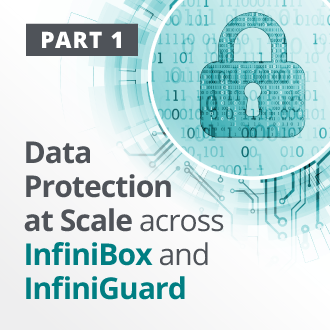Data Protection at Scale across InfiniBox and InfiniGuard (Part One)

Data protection is one of the most important safeguards that a company can have in this day and age. As the amount of data that is created and stored continues to skyrocket – with exponential growth every year – the need for tighter data protection at scale only increases.
Employees and customers also have no tolerance for any trouble accessing information, whether because of a ransomware attack or downtime due to a storage system that does not have enough redundancy or correction capabilities.
When an enterprise company is evaluating Infinidat as a storage solution provider, it’s not unusual to be asked about data protection capabilities across our InfiniBox® storage platform and our InfiniGuard® cyber recovery appliance. These are two powerful solutions that complement each other from primary storage to data backup.
Understanding the different levels of data protection helps IT leaders implement best practices in data infrastructure. The following are simplified descriptions of three important levels that can make or break a company:
- The most basic of protection is the physical management of detecting and correcting errors in the storage hardware (usually the underlying media). The drives rectify errors before they have an impact on availability.
- The second level is the system level redundancy, which includes technologies such as RAID. High availability systems will also implement multiple nodes able to perform similar operations for system level redundancy. A high availability cluster consists of three nodes at minimum.
- The third level is cyber recovery which resides in the upper levels of the storage system. Infinidat’s cyber recovery capabilities make data backup immutable, so data cannot be corrupted. You can simply point to an immutable snapshot and recover all of your data.
Combining all three levels of protection across the InfiniBox and InfiniGuard platforms create a 100% data recovery and storage platform protection against cyberattacks and errors in the systems or in the media that would cause downtime.
Protection within the Box
Having an extra layer of redundancy in the primary storage system is an additional safety net that gives CIOs and IT teams peace of mind. The third node that we have in the InfiniBox architecture delivers redundancy that is an order of magnitude better. If you care about availability in the machine, you want the third node.

The triple redundancy, which the InfiniBox provides, reinforces data protection. The improvement makes the built-in redundancy exponentially better than dual redundancy, staying ahead of and neutralizing internal errors that come with any hardware from any vendor. infiniBox can withstand a large amount of physical faults ‒ be it in local drives, SSD, IB and, even electrical, and still have the data available.
Infinidat gives customers flexible choices about hardware. It is our software that makes the real difference. So, an IT leader can select hard disk drive (HDD) or solid state drive (SSD) as the underlying hardware. It doesn't really matter. In either case, Infinidat fully qualifies the hardware.
We provide the extra safety net of testing all hardware for any storage system we ship. In fact, each system undergoes very vigorous tests due in the process of assembly with hundreds of tests and thoroughly validates each hardware complement of the system in the production line. This quality control and quality assurance for data protection give CIOs great confidence in the platform solution, much beyond the quality of each component that is provided by it’s vendor.
Part 2 of this blog post will explore data protection against cyber attacks.
For more information about the InfiniBox, click here.

